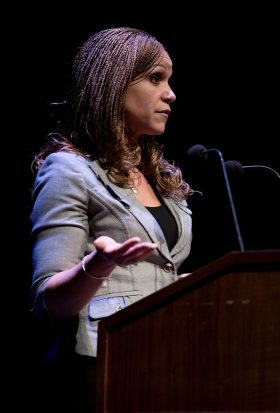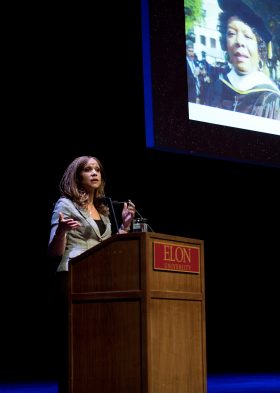Channeling the teachings of the late Rev. Dr. Martin Luther King Jr., journalist and author Melissa Harris-Perry called on Elon University students Wednesday to engage with people who hold different beliefs rather than avoid difficult conversations that can lead to personal growth.

Those are some of the most recognizable names on a list of people killed during their interactions with the law enforcement system, said author and journalist Melissa Harris-Perry, an MSNBC talk show host who visited Elon University on Wednesday to deliver the 2016 MLK Commemorative Keynote Address in a sold-out McCrary Theatre lecture.
There also was Freddie Gray. Akai Gurley. Walter Scott. Sandra Bland. Miriam Carey. John Crawford. Most recently, a Chicago teenager with mental health concerns, and a nearby neighbor, were both shot dead by police after the teen’s father called 911 for assistance. Their names were Quintonio LeGrier and Bettie Jones.
But as Harris-Perry pointed out, none of those fatalities were the start of Obama’s handling of police interactions with black citizens. That distinction is given to Harvard Professor Skip Gates, who made international news in 2009 when officers in Cambridge arrested the acclaimed scholar after he attempted to break into his own home because he was without keys.
“It’s the first time the president talks about race. It’s easy to lose, because it’s such a small moment,” she said. “They have a ‘beer summit’ and it’s kind of over. But it almost ends up being the thing of the entire presidency – the policing of black men’s bodies.”
Harris-Perry’s Jan. 6 talk, “We Will Need Courage,” kicked off a month of programming and activities at Elon University focused on the legacy of the Rev. Dr. Martin Luther King Jr. Using her customary humor and insight, the host of “Melissa Harris-Perry” on MSNBC focused much of her talk on questions of race, social justice, and the “messy” democracy in which we live.
Harris-Perry cited King’s remarks on courage being the most important virtue, as courage allows people to practice other virtues consistently.
“You came of age in a political and racial and social moment that is grappling with the question, do black lives matter? You can take no position if you want, but that seems silly,” she said. “Whatever we think we’re going to do, whatever we think we are going to learn from this moment, we are going to have to be courageous.”
Harris-Perry reminded students that higher education is intended to stretch their minds and challenge their assumptions. She applauded students at other colleges who have protested conditions and institutional responses to acts of bias in recent months, though she argued that college isn’t supposed to be a simple matter of reinforcing existing beliefs.
As students encounter and analyze and process new information, their views will change. Assumptions will change. Harris-Perry said that new ideas, even those with which students disagree, are important in college. That doesn’t mean students should ignore acts of violence or intolerance.
“It should be hard (in college). And if it wasn’t, if it was all parties and sunshine, then we have failed,” she said. “But even though it’s supposed to be hard, it’s supposed to be safe. College is supposed to challenge you. It’s not supposed to harm you.”

She complimented Elon on its U.S. News & World Report #1 rankings, its School of Communications, the Doritos ad filmed by Elon students and staff that is now a finalist in a Super Bowl ad competition, and the selection of David Gergen as the university’s Commencement speaker in May. She added that she was inspired by a dinner series taking place this month in which the Truitt Center for Religious and Spiritual Life is asking students “who matters to God?”
“I like Elon so much it almost makes me wish I was 19 again,” she said.
Harris-Perry is the Presidential Endowed Chair in Politics and International Affairs at Wake Forest University, where she also served as executive director of the Pro Humanitate Institute and founding director of the Anna Julia Cooper Center on Gender, Race, and Politics in the South.
She is the author of the award-winning “Barbershops, Bibles, and BET: Everyday Talk and Black Political Thought,” and “Sister Citizen: Shame, Stereotypes, and Black Women in America.”
Harris-Perry received her bachelor’s degree in English from Wake Forest University in 1994 and her doctorate in political science from Duke University in 1999. She also studied theology at Union Theological Seminary in New York. Harris-Perry previously served on the faculty of the University of Chicago, Princeton University and Tulane University.
Her visit kicks off Elon’s 2016 Dr. Martin Luther King, Jr. Beloved Community Celebration organized by the Center for Race, Ethnicity & Diversity Education, Elon Teaching Fellows, the Kernodle Center for Service Learning and Community Engagement, the Office of Student Activities, and the Truitt Center for Religious and Spiritual Life.
Additional programs this month include service programs, a remembrance march, a special College Coffee and a social justice poetry slam.


